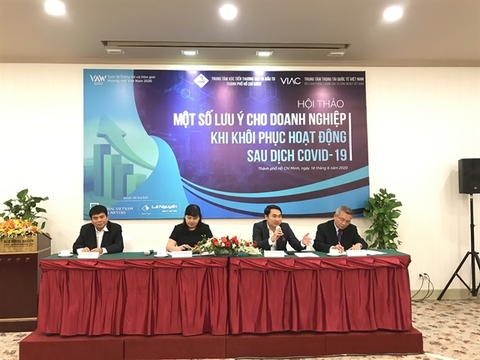
Speakers at a meeting on economic recovery post-COVID-19, organised by ITPC and VIAC. — VNS Photo Bo Xuan Hiep
Enterprises should carefully study the “force majeure” clauses in contracts and consult experts in assessing their rights and obligations pertaining to the clauses to resolve any disputes on contract performance obligations during the COVID-19 pandemic, experts have said.
Speaking at a meeting on June 18 in HCM City, Luong Van Ly, senior advisor of Global Lawyers, and an arbitrator at the Viet Nam International Arbitration Centre (VIAC), said businesses are trying to “figure out whether they, or those with which they have contracted, are excused from contract obligations or have modified duties to perform”.
Disputes include those related to space lease contracts and contracts for sale of products and services such as hotel reservations, tour arrangements, and labour contracts, he said.
Those disputes arise from relevant parties having difficulties in cash flows and sharp decline in revenue caused by social distancing and other measures imposed by the Government, which result in insolvency, he said.
If a contract does not have a force majeure clause about the pandemic and just considers the pandemic a “circumstance of fundamental change”, enterprises should think of bringing the dispute to court, he said.
However, Ly said negotiations should be considered to ensure benefits for all parties to avoid wasting time and money.
Today, many contracts have “force majeure clauses” but it is important to determine whether the pandemic is a force majeure event, according to Ly.
Commercial disruptions caused by travel restrictions, quarantine and social distancing orders, cancellations of large gatherings, and other measures taken to address the crisis will qualify as a force majeure event under many contracts, according to experts.
Force majeure is a term commonly used for contract clauses that deal with unexpected events beyond the control of the contracting parties. These are sometimes called “Acts of God” provisions, and may address natural disasters such as floods, tornadoes, earthquakes and hurricanes, or man-made disruptions such as acts of terrorism, riots, strikes and wars.
Lawyer Le Thanh Kinh, director of Le Nguyen law firm, and an arbitrator at VIAC, said in case of contract cancellation, enterprises must learn about force majeure provisions in international trade to avoid unnecessary risks.
According to both Vietnamese law and international law, an event is considered a force majeure if it was unforeseen and unavoidable despite taking all necessary measures, he said.
“However, it should be noted that the force majeure provision must be carefully considered and studied,” he added.
Online business
Speaking at the event, Le Thanh Kinh, director of Le Nguyen law firm, and an arbitrator at VIAC, said Viet Nam’s retail market in recent years had maintained a high growth rate averaging at about 10 per cent per year, with the retail market value estimated at US$160 billion in 2020.
The country is considered one of the fastest growing e-commerce markets in Southeast Asia, second only to Indonesia, he said.
With high and continuous growth since 2015, Viet Nam’s e-commerce had a growth rate of over 30 per cent in 2018, worth about $7.8 billion, according to the Viet Nam E-Commerce Association.
“The number of people using online shopping on e-commerce platforms has also skyrocketed.”
The country saw 39.9 million people shopping online last year, an increase of 11.8 per cent compared to 2018, and nearly double after only three years. The value of online shopping per capita reached $202, up 8.6 per cent year-on-year.
In addition, a legal framework for online business activities has been issued by the Government.
According to Kinh, online business has helped companies survive the current pandemic as consumers are increasingly using the internet to search for products and shop online.
Non-cash payment methods, especially mobile payments, have also become more popular. With social network platforms such as Facebook, Zalo, Tiktok, Instagram, and YouTube, online sales have become increasingly important for companies, he said.
“Businesses should look for new partners instead of depending on a few foreign customers,” he added. Enterprises should also learn about the legal status of the new partners.
Also speaking at the seminar, Cao Thi Phi Van, deputy director of the HCM City Investment and Trade Promotion Centre (ITPC), said to take advantage of free trade agreements (FTAs), businesses should promote market research and regularly update market requirements, improve their competitiveness and quality of human resources; and promote the use of hi-tech in business and production.
They must also understand FTA commitments to make the most of tariff preferences and risk prevention, she said.
Viet Nam has signed 13 FTAs with 58 countries and territories, of which 12 have entered into force. The EVFTA was approved by the National Assembly on June 8. Three FTAs are still under negotiation.
The seminar was organised by ITPC and VIAC. — VNS